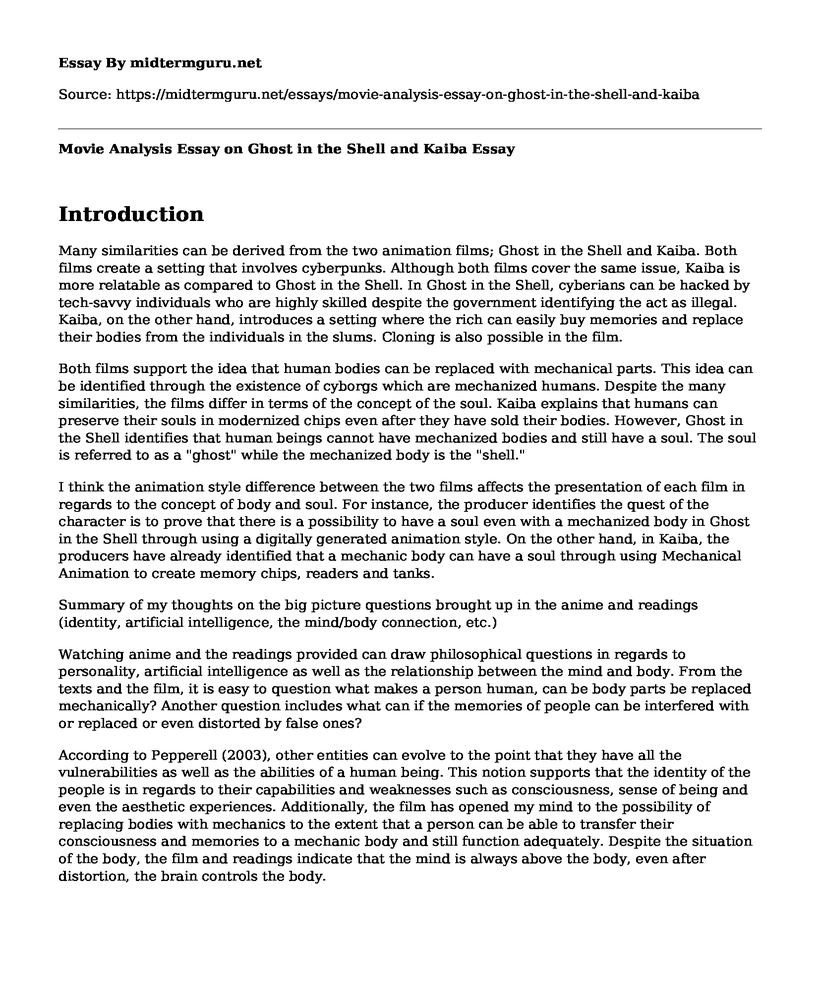Introduction
Many similarities can be derived from the two animation films; Ghost in the Shell and Kaiba. Both films create a setting that involves cyberpunks. Although both films cover the same issue, Kaiba is more relatable as compared to Ghost in the Shell. In Ghost in the Shell, cyberians can be hacked by tech-savvy individuals who are highly skilled despite the government identifying the act as illegal. Kaiba, on the other hand, introduces a setting where the rich can easily buy memories and replace their bodies from the individuals in the slums. Cloning is also possible in the film.
Both films support the idea that human bodies can be replaced with mechanical parts. This idea can be identified through the existence of cyborgs which are mechanized humans. Despite the many similarities, the films differ in terms of the concept of the soul. Kaiba explains that humans can preserve their souls in modernized chips even after they have sold their bodies. However, Ghost in the Shell identifies that human beings cannot have mechanized bodies and still have a soul. The soul is referred to as a "ghost" while the mechanized body is the "shell."
I think the animation style difference between the two films affects the presentation of each film in regards to the concept of body and soul. For instance, the producer identifies the quest of the character is to prove that there is a possibility to have a soul even with a mechanized body in Ghost in the Shell through using a digitally generated animation style. On the other hand, in Kaiba, the producers have already identified that a mechanic body can have a soul through using Mechanical Animation to create memory chips, readers and tanks.
Summary of my thoughts on the big picture questions brought up in the anime and readings (identity, artificial intelligence, the mind/body connection, etc.)
Watching anime and the readings provided can draw philosophical questions in regards to personality, artificial intelligence as well as the relationship between the mind and body. From the texts and the film, it is easy to question what makes a person human, can be body parts be replaced mechanically? Another question includes what can if the memories of people can be interfered with or replaced or even distorted by false ones?
According to Pepperell (2003), other entities can evolve to the point that they have all the vulnerabilities as well as the abilities of a human being. This notion supports that the identity of the people is in regards to their capabilities and weaknesses such as consciousness, sense of being and even the aesthetic experiences. Additionally, the film has opened my mind to the possibility of replacing bodies with mechanics to the extent that a person can be able to transfer their consciousness and memories to a mechanic body and still function adequately. Despite the situation of the body, the film and readings indicate that the mind is always above the body, even after distortion, the brain controls the body.
My Opinions About Anime Remakes
The "white-wash" controversy in Ghost in the Shell arose after the actors that played the leading roles were all White Americans. The frustrated Asian Americans who felt that the part should have been given to Asian American actors or any actor with an Asian descent and not a white American first raised this outcry. However, the producers defended themselves by explaining that the change in casting for the main character was a form of modernizing the film into one that was less stereotypical. This reasoning further serves to highlight the point that anime remakes serve as exciting ways to refresh and broaden an idea that was presented in the previous version.
In the case of Ghost in the Shell, I think the controversy surrounding the "white-wash" served to bring attention to the new remake of the film further. Many people will purchase the movie due to the dispute connected to it so that they can be able to make valid contributions to the discussions. Besides, I think that even though the historical context of any artwork may help provide information on a given art, there are times that the social context of the art is more likely to be analyzed.
Reference
Pepperell, R. (2003). Chapter Seven: Synthetic Beings. In The Posthuman Condition: Consciousness Beyond the Brain. Intellect Books.
Cite this page
Movie Analysis Essay on Ghost in the Shell and Kaiba. (2022, Dec 30). Retrieved from https://midtermguru.com/essays/movie-analysis-essay-on-ghost-in-the-shell-and-kaiba
If you are the original author of this essay and no longer wish to have it published on the midtermguru.com website, please click below to request its removal:
- The New Yorker Article: Two Men Arrive in a Village by Zadie Smith
- Use of Imagery in Annie Dillards Book Pilgrim at Tinker Creek
- "The Red Convertible" by Louise Erdrich and Sherman Alexie's Film "Smoke Signals" - Literary Analysis Essay
- Apple's iPhone: Quality Smartphone, Cutting-Edge Tech - Essay Sample
- Music: A Journey From Africa to Humanity's Soul - Essay Sample
- Innovation: Key to Competing in High-Demand Markets - Research Paper
- 18th Century Photography: American Inventors' Contributions - Essay Sample







